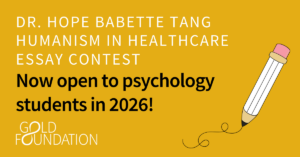 This post is part of our series of Research Roundups — a list of recently published studies on humanism in medicine. If you would like to be notified each time a Research Roundup is published, send an email to bking@gold-foundation.org with the subject line “Subscribe RR”.
This post is part of our series of Research Roundups — a list of recently published studies on humanism in medicine. If you would like to be notified each time a Research Roundup is published, send an email to bking@gold-foundation.org with the subject line “Subscribe RR”.
Burnout in emergency department healthcare professionals is associated with coping style: A cross-sectional survey
Howlett M, Doody K, Murray J, LeBlanc-Duchin D, Fraser J, Atkinson P. Emerg Med J. 2015 Jan 20
Over 600 emergency department staff members took measures related to burnout and coping style. Researchers found that those who used task-oriented coping measures (trying to solve the problem) were at a decreased risk for burnout and those who used emotion-oriented coping (trying to change how they felt about a problem) were at an increased risk for burnout.
BREATHE OUT: A randomized controlled trial of a structured intervention to improve clinician satisfaction with “difficult” visits
Edgoose JY, Regner CJ, Zakletskaia LI. J Am Board Fam Med. 2015 Jan-Feb;28(1):13-20.
This randomized trial of 57 clinicians evaluated a pre- and post-visit patient-centered and clinician-reflective technique called BREATHE OUT. Researchers found that using this technique with difficult patients improved clinician satisfaction during those visits.
Standardized patient assessment of medical student empathy: Ethnicity and gender effects in a multi-institutional study
Berg K, Blatt B, Lopreiato J, Jung J, et al. Acad Med. 2015 Jan;90(1):105-11.
Over 575 medical students of various ethnicities were assessed by 84 standardized patients of various ethnicities. Researchers analyzed more than 2,800 student-standardized patient encounters and participants completed measures of empathy. They found that gender and ethnicity played a large role in how students were judged which raises questions about possible biases in assessments of their clinical skills.
Underlying construct of empathy, optimism, and burnout in medical students
Hojat M, Vergare M, Isenberg G, Cohen M, Spandorfer J. Int J Med Educ. 2015 Jan 29;6:12-6.
Researchers gave three different measures (empathy, optimism and burnout) to over 250 medical students. The results confirmed that those with positive personality attributes are likely to also have empathy in the context of patient care.
Transforming educational accountability in medical ethics and humanities education toward professionalism
Doukas DJ, Kirch DG, Brigham TP, Barzansky BM, et al. Acad Med. 2014 Dec 23.
The Project to Rebalance and Integrate Medical Education National Conference on Medical Ethics and Humanities in Medical Education (May 2012) invited representatives from the three major medical education and accreditation organizations to engage with an expert panel of nationally known medical educators in ethics, history, literature, and the visual arts. This article focuses on four themes of integrating professionalism into medical education.
The experience of Patient Aligned Care Team (PACT) members
Ladebue AC, Helfrich CD, Gerdes ZT, Fihn SD, Nelson KM, Sayre GG. Health Care Manage Rev. 2014 Dec 23.
Researchers analyzed the free-text responses of over 3,800 participants in the Patient Aligned Care Team (PACT) initiative of the Veterans Health Administration (VHA). Although respondents viewed PACT positively as a model and reported it improved relationships with patients and increased patient satisfaction, they described multiple barriers to achieving functioning teams and several unintended negative consequences.
 This post was written by Brandy King, Head of Information Services at The Arnold P. Gold Foundation Research Institute
This post was written by Brandy King, Head of Information Services at The Arnold P. Gold Foundation Research Institute


